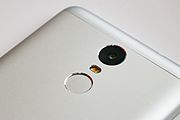
Fingerprint scanners are security systems of biometrics. They are used in police stations, security industries, smartphones, and other mobile devices.
Fingerprints
People have patterns of friction ridges on their fingers, these patterns are called the fingerprints. Fingerprints are uniquely detailed, durable over an individual's lifetime, and difficult to alter. Due to the unique combinations, fingerprints have become an ideal means of identification.
Types of fingerprint scanners
There are four types of fingerprint scanners: optical scanners, capacitance scanners, ultrasonic scanners, and thermal scanners. The basic function of every type of scanner is to obtain an image of a person's fingerprint and find a match for it in its database. The measure of the fingerprint image quality is in dots per inch (DPI).
- Optical scanners take a visual image of the fingerprint using a digital camera.
- Capacitive or CMOS scanners use capacitors and thus electric current to form an image of the fingerprint. This type of scanner tends to excel in terms of precision.
- Ultrasonic fingerprint scanners use high frequency sound waves to penetrate the epidermal (outer) layer of the skin.
- Thermal scanners sense the temperature differences on the contact surface, in between fingerprint ridges and valleys.
All fingerprint scanners are susceptible to be fooled by a technique that involves photographing fingerprints, processing the photographs using special software, and printing fingerprint replicas using a 3D printer.
Construction forms

There are two construction forms: the stagnant and the moving fingerprint scanner.
- Stagnant: The finger must be dragged over the small scanning area. This is cheaper and less reliable than the moving form. Imaging can be less than ideal when the finger is not dragged over the scanning area at constant speed.
- Moving: The finger lies on the scanning area while the scanner runs underneath. Because the scanner moves at constant speed over the fingerprint, imaging is superior.
Usage form
Fingerprint biometrics find applications in various fields and industries.
Stand-alone readers
Microsoft released a fingerprint reader in 2005.
Integrated readers
From early 2000, some laptops with PC Card support can be equipped with readers; for example, Compaq Armada E500 can be optionally equipped by external fingerprint reader since 2000 - the reader module was released by Toshiba. IBM produced laptops with integrated readers since 2004. Apple's marketing name of electronic fingerprint recognition, known as Touch ID, was introduced in 2013 only for smartphones, and laptop option was released only in 2016. The implementation was delayed until 2013 just because the integrated with optical trackpad scanner were be patented by RIM (Blackberry) in 2004. On laptops and smartphones, the fingerprint sensor usually uses USB or I2C interface.
See also
References
- "Police - Fingerprinting | Britannica". www.britannica.com. Retrieved 4 March 2023.
- "iPhone's new fingerprint sensor knows you from Adam". NBC News. 10 September 2013. Retrieved 4 March 2023.
- "The Best Tablets With Fingerprint Sensors: 2018 Edition". MyNextTablet. Retrieved 4 March 2023.
- "Best laptops with a fingerprint scanner". Business Insider. Retrieved 4 March 2023.
- Woodford, Chris (17 June 2008). "How do fingerprint scanners work". Explain that Stuff. Retrieved 4 March 2023.
- "Are fingerprints determined by genetics?: MedlinePlus Genetics". medlineplus.gov. Retrieved 4 March 2023.
- Rouse, Margaret (March 2021). "Experts Agree: Face ID Is Not The Answer, In-Display Fingerprint Sensors Are". display. E3displays. Retrieved 8 March 2021.
- Sadasivuni, Kishor Kumar; Houkan, Mohammad Talal; Taha, Mohammad Saleh; Cabibihan, John-John (August 2017). "Anti-spoofing device for biometric fingerprint scanners". 2017 IEEE International Conference on Mechatronics and Automation (ICMA). IEEE. pp. 683–687. doi:10.1109/icma.2017.8015898. ISBN 978-1-5090-6758-9. S2CID 40404001. Archived from the original on 17 January 2021. Retrieved 27 October 2020.
- Winder, Davey. "Hackers Claim 'Any' Smartphone Fingerprint Lock Can Be Broken In 20 Minutes". Forbes. Archived from the original on 19 December 2019. Retrieved 19 December 2019.
- "What is a fingerprint scanner?". VERSUS. Retrieved 4 March 2023.
- Luepke, Lara. "Microsoft Wireless IntelliMouse Explorer with Fingerprint Reader". CNET. Retrieved 2 July 2021.
- Vaidya, Gopika. "CNN.com - Technology - Toshiba outfits laptops with fingerprint reader - November 22, 2000". edition.cnn.com. Retrieved 2 July 2021.
- "IBM Introducing Fingerprint Reader into Laptop | Security | TechNewsWorld". www.technewsworld.com. 4 October 2004. Retrieved 2 July 2021.
- Sacco, Al (4 October 2013). "Before Touch ID: BlackBerry Filed for Trackpad-Fingerprint-Scan Patent in '04". CIO. Retrieved 2 July 2021.